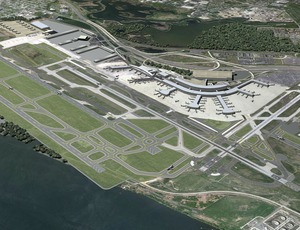
After months of silence while it negotiated project issues with airlines and residents, the city of Philadelphia announced on June 4 that a team led by CH2M Hill Cos. will be program manager for a major expansion of Philadelphia International Airport.
The estimated $6.4-billion capacity-enhancement program (CEP) would be the largest such aviation expansion in the U.S., says CH2M Hill;
Negotiations are continuing with the facility's key occupants over core elements of the expansion program and costs could grow as the project's scope is better defined.
Chosen to lead the expansion is Global Program Partners, a joint venture in which Denver-based CH2M Hill has a 54% stake. Partners are design firm Delon Hampton & Associates, Washington, D.C., and construction inspection firm CMTS Inc., Dallas. Both are minority-owned and have a 23% stake, says Jhan Schmitz, CH2M Hill senior vice president and program director. He confirms that the team will be paid $25 million in the program's first four years.
"Having a project management office in place is the next big step in the CEP process," said Rina Cutler, Philly's deputy mayor for transportation and utilities, in a statement. A program source says the winning team has a notice to proceed and expects a formal contract by month's end.
The city says proposals were also submitted by URS Corp.; a team of Parsons Brinckerhoff and Parsons Corp.; and AECOM.
The latter developed the project's master plan and is a veteran of work on airport capital improvement. "AECOM has been a great partner on the master planning, but we felt the team led by CH2M Hill responded the best overall," says Andrew Stober, Cutler's chief of staff.
CH2M Hill describes the planned program as one of the most complex in the U.S., with construction occuring amid normal airport operations. It is anticipated to take 12 to 15 years to complete, says CH2M Hill.
Schmitz, who has run large airport programs in Hong Kong and Saudi Arabia, says the airport, some of which dates to the 1940s, "is a hodgepodge of elements. We will set standards that make sense."
Construction of a new runway, the airport's fifth, and extension of two existing runways are among the construction elements. Work also includes terminal expansion; construction of a people-mover system between the terminal and parking area; a central ground transportation center; and construction of new support facilities, including air traffic control, airport maintenance, deicing and corporate hangars.
The planned new runway appears to be most controversial, with key airport tenants US Airways and Southwest Airlines claiming it won't relieve congestion problems that more often occur in crowded skies affecting airport traffic, say local reports.
The city is still negotiating with the airlines over project components and costs. "Discussions are focused on sequencing and timing, not changing the scope," says Stober.
Airline executives say the program cost, which they pay though facility fees, could reach $10.5 billion.
Schmitz says the $6.4-billion figure is a 2010 number in the master plan and is likely to change. But he says, "The airlines are not against the program. It's a classic clash between airlines and an airport." Schmitz says master-plan modifications are under way.




